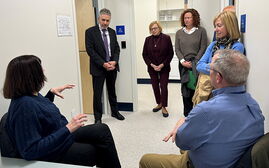Mainers will receive $850 relief checks under new state budget, ready for Mills' signature
 File photo
The Maine Legislature on Tuesday approved a proposed supplemental budget that will provide $850 relief payments for many Mainers.
File photo
The Maine Legislature on Tuesday approved a proposed supplemental budget that will provide $850 relief payments for many Mainers.
More than 857,000 Maine households are in line to receive $850 relief checks under the state's new supplemental budget, set to be signed into law by Gov. Janet Mills on Wednesday afternoon.
The spending plan for the state's $1.2 billion budget surplus also includes a one-time investment in Maine Veterans' Homes in Caribou and Machias and funding for nursing homes, hospitals and long-term care; funding for education, housing and access to justice; and ballot protection and custody measures to improve election security.
Mills was scheduled to sign the supplemental budget into law at a ceremony in Augusta after lawmakers approved the measure on Tuesday. The vote was 119-16 in the House and 32-2 in the Senate.
“This supplemental budget represents the Maine Legislature at its best — Democrats, Republicans, and Independents coming together around a smart, commonsense proposal that delivers for Maine families, communities, small businesses and retirees," said Senate President Troy Jackson, D-Allagash.
The budget provides $850 in direct relief to more than 857,000 eligible working families and older Mainers to help pay for rising energy costs, driven by the Russian invasion of Ukraine and the increase in natural gas prices, as well as inflation. Checks are expected to start going out in June.
While Mills originally proposed relief for single filers who make up to $75,000 a year and couples earning $150,000, Republicans successfully lobbied to expand eligibility to single filers making up to $100,000 and couples filing jointly who make up to $200,000.
"Democrats and Republicans negotiated a budget with a shared goal of ensuring that direct relief gets to Maine people quickly," said Teresa Pierce, House chair of the Appropriations Committee.
Also commenting on the measure's bipartisan support, House Speaker Ryan Fecteau added, "This agreement on the supplemental budget is the kind of work the people of Maine expect from their leaders and this budget will fund direct relief and meaningful action. It will help Maine recruit and retain our child care workforce and increase the supply of housing to meet the overwhelming demand in our state."
Among education measures, the supplemental budget provides up to two years of free community college for all students graduating from high school from 2020-2023 who enroll in a Maine community college full-time; freezes tuition for Maine residents pursuing a four-year degree at the University of Maine System so they can complete their program and enter the workforce; and boosts student loan relief from $2,000 to $2,500 for graduates of two- or four-year colleges who live and work in Maine after graduation, up to $25,000 in total.
Other provisions aim to help Maine weather the crisis caused by PFAS or "forever" chemicals through a new $60 million fund to address contamination by the dangerous man-made substances. The budget also includes measures to improve testing and provide funding to abate, clean up and mitigate threats or hazards posed by PFAS.













0 Comments